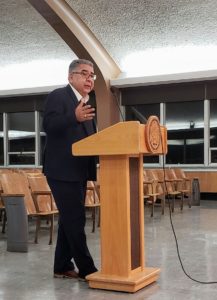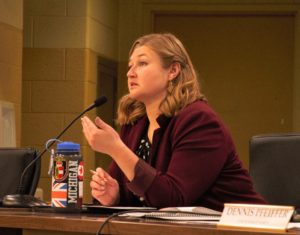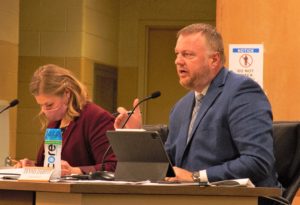By Tom Travis
In a 5-0 vote Wednesday city council voted to hold four community listening meetings throughout the city for residents to say how they think the $94 million federal stimulus American Rescue Plan allocated to the city should be spent. The first half of the allocation already has arrived, with the second half expected within the next 60 days.
However, after a presentation by a representative from U.S. Rep. Dan Kildee’s office and give-and-take with city officials, several council members wondered if community meetings might be premature when it still is not clear what the rules are as to how the money can be used. A draft plan exists doling out the funds into five “buckets” has been prepared by city officials based on what is known so far, but officials said they welcome more input from the public and the council.
Wednesday’s special council meeting had been called by Mays and Councilperson Pfeiffer (Ward 8) specifically to discuss allocation of the ARP funds with city administration. The city’s Chief Financial Officer (CFO) Robert Widigan and City Administrator Clyde Edwards represented Mayor Neeley’s administration to answer questions about the funds.
Councilperson Dennis Pfeiffer made the motion for council members to hold the meetings — one each in the north, south, east and west sides of Flint.
The five yes votes came from Councilpersons Eric Mays (Ward 1), Jerri Winfrey-Carter (Ward 5), Tonya Burns (Ward 6), Allie Herkenroder (Ward 7) and Dennis Pfeiffer (Ward 8). Councilpersons Ladel Lewis (Ward 2), Judy Priestley (Ward 4) and Eva Worthing (Ward 9) were absent from the meeting. Councilperson Quincy Murphy (Ward 3) had left the meeting earlier in the evening. The date, time and place of the meetings were not announced.
Chris Flores, District Director of Flint for U.S. Rep. Dan Kildee and resident of Flint’s 7th Ward, presented pages of documents to the city council including frequently asked questions about a municipal’s responsibility in allocating ARP funds and details about the “interim rules” from the U.S. Treasury. City Council President Eric Mays (Ward 1) had invited Flores to the meeting.

Mays asked Flores when the “interim rules” would be “final rules” from the U.S. Treasury. Flores responded, “We don’t know. But as of May 17 the rules that are in place [the interim rules] are the ones that have to be followed and enforced.”
Flores added, at one point it was going to be required that each municipality would have to submit reporting plans but not any more. As of the 15th there is no required submission of a “plan” of how the dollars are to be spent by municipalities. But what is required is each municipality must be “transparent” of how the funds are spent, he said.
Flores said Flint could receive the second payment of the $94 million ARP funds within 60 days.
Concern over bid process and using a compliance firm raised by council
In last week’s meeting, Widigan explained the Finance Department reviewed eight consultants for the contract that submitted bids. Four were in Michigan and the remaining four were in Washington D.C., Tampa, FL, Falls Church, VA and Utica, NY.
The city’s finance department vetted each firm with a series of questions and a deadline of Oct. 18 to answer. According to Widigan, eight of the firms responded by the deadline and one firm responded a day late on Oct. 19, their bid was not considered in the final bid process. The eight bids considered ranged from $590,000 to $7.5 million.
The final four were chosen based on: total cost, whether or not the firm would subcontract out work, proximity to Flint and Genesee County, work with other Michigan communities, and overall experience working with government grants, Widigan stated.
In this week’s meeting, Councilperson Pfeiffer asked Assistant City Attorney William Balcer, “Can this councilmember FOIA those documents [the compliance firm bid documents]?” Balcer hesitated before saying, “I’d have to review it myself. My initial reaction is that this may be something that is exempt [from FOIA].” Balcer added that if the bid documents are not “FOIA-able” the ‘legislative body’ could possibly receive them.

Assistant City Attorney William Balcer answered questions from council members during Wednesday’s meeting. (Photo by Tom Travis)
Councilperson Herkenroder (Ward 7) stated she was familiar with an “objective scoring rubric” that in her professional career was provided to boards to see how firms rank and why certain bidders were considered or not considered.
Herkenroder asked Widigan if the city has a standard scoring rubric or matrix used for bid process, and if so, could the council see it. Widigan said he could provide the scoring rubric to the council.
City of Flint “five buckets” for allocating ARP funds
In May 2021 the City of Flint released a 3-page document (available here and on the city of Flint website) a proposed draft plan to allocate the federal ARP funds.
Councilperson Herkenroder (Ward 7) asked Widigan why “compliance” is not in any of the five buckets on the administration’s ARPA spending allocations?
In a follow-up email Widigan explained, “The five (5) spending categories or “buckets” on the first page of the draft plan was derived from gathering public feedback; reviewing the city’s Master Plan and the Capital Improvement Plan; and what we (administration) believe at this time is eligible per the interim guidelines from U.S. Treasury – which are subject to change. We are recommending this is the direction we go. However, we welcome further input from the public and the council. ”
Herkenroder asserted, “I think that this city and this body is deserving of having a little bit more transparency with where the administration is thinking where the administration is thinking they want the most dollars to go within these buckets. We can’t tell the weight of these buckets is most important.”
Herkenroder voiced concerns about the ARP spending proposal saying, “I’m not seeing any long term solutions for our community. These are one-time dollars that we will never get again. Why are we not focusing on long-term solutions to help move our city in a tremendously forward fashion?”

City Council Vice-President Allie Herkenroder (Ward 7) questions the City’s CFO Robert Widigan in Wednesday’s council meeting. (Photo by Tom Travis)
Widigan said, “Again this is a draft” and argued that blight elimination, economic development and infrastructure improvements are “long-term solutions” and benefit to the city.
Both Herkenroder and Pfeiffer called for dollar amounts to be put on the proposed draft. “I think it’s been made very clear by my collegues we need to see dollar amounts associated with these different categories. Period, point blank,” Herkenroder said.
Widigan assured the council that dollar amounts will be added with the categories.
“Revenue replacement”
Councilperson Pfeiffer asked, “You do not have any revenue replacement as a bucket that needs to come out of the COVID [ARP] funds?”
Widigan responded, “This is a draft proposal and revenue replacement would have to go into that but we are working on a formula for that.” Pfeiffer said his “recollection” was that $2 to $4 million of ARPA funds could be used towards revenue replacement.

City Councilperson Dennis Pfeiffer (Ward 8). (Photo by Tom Travis)
Pfieffer asked how the council could meet with the community concerning allocation of the ARPA money when it is still unclear what can be spent.
Pfeiffer then began to subtract already discussed amounts from the $94 million ARP fund total. He noted that subtracting $4 million for compliance firm Ernst & Young, then subtracting $2 to $4 million for revenue replacement brings the total amount lower.
Pfeiffer and Mays contested that the Council can make a proposal of how to spend the ARP funds
Pfeiffer asked Widigan if it is the administration’s point of view that the council can’t allocate the ARP dollars until the administration provides a proposal.
Widigan responded, “I would say that the administration wants to get a compliance firm in place.” Pfeiffer interjected, “compliance and allocation are two different things.” Widigan said according to the city charter any budget amendment must come from the mayor.
Council President Mays and Pfeiffer debated with Edwards concerning the interpretation of Sec. 7-105 “Amendments After Adoption” portion of the city charter.
Sec. 7-105 AMENDMENTS AFTER ADOPTION.
A. No officer or agency of the City of Flint shall have the authority to transfer budgeted funds from one departmental budget to another without a budget amendment authorizing the expenditure passed by the City Council.
B. At any time during the fiscal year, upon written request of the Mayor, the City Council may consider amendments to the previously adopted budget which:
1. Transfer an unencumbered appropriation balance from one program, service or activity to another;
2. Provide for expenditure of revenues in excess of those in the budget; or
3. Meet a public emergency affecting life, health, property or the public peace which may require emergency appropriations as provided by statute.
C. If the action taken by the City Council differs from the action requested by the Mayor, the Mayor may exercise the veto power.
Edwards told the council, “You as a legislative body receive the funds. Now it’s time to talk about spending of the funds.” Which Edwards argued “b – 2” in the purchasing ordinance “talks about directly.”
Mays pressed Edwards by asking how he reconciles that the council make rules for spending block grant funds when they are received. Mays asserted that the block grant money is not different than “all other pots” [of money].
Mays asked Edwards and Widigan if there was a rule anywhere in the U.S. Treasury’s “interim rules” for ARP allocation that spells out who can allocate the money.
Widigan stated that he has not seen in the U.S Treasury “interim rules” where it says who can allocate the funds.
During council response after public speaking Councilperson Herkenroder (Ward 7) concerning the ARP funds said, “We have to get creative. We have to think innovatively. And we have to reach across different municipal lines so that we can utilize these funds to the best of our ability.”
Herkenroder, in an email to EVM, said, “I mean working together with the City, County, and School Board to provide the best possible future for our community. This is beyond Wards (although we have to work together in that regard too). I’m open to conversations with other communities about their process for allocation, but ultimately the community voice is most important for where we allocate.”
EVM Managing Editor Tom Travis can be reached at tomntravis@gmail.com


You must be logged in to post a comment.